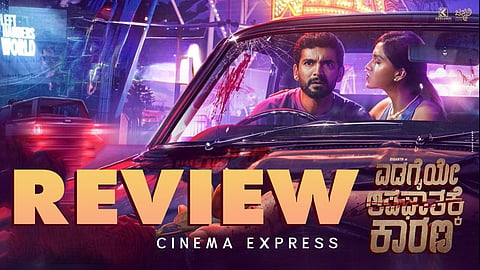Edagaiye Apaghatakke Karana Movie Review: Diganth nails it right in left-handed chaos
Edagaaiye Apaghatakke Karana(3.5 / 5)
Kannada cinema rarely ventures into black comedy — and even less so into territory as absurdly specific as the stigma of being left-handed. But Samarth Kadkol’s debut feature, Edagaaiye Apaghatakke Karana ('The Left Hand Is the Cause of the Accident'), doesn’t just dip a toe into the genre — it dives in, armed with satire, suspense, and a surprisingly emotional core.
Right from the opening disclaimer — 'No animals were harmed in the making of this movie. Humans? Emotionally and physically bruised.' — it’s clear this isn’t your average thriller. Samarth Kadkol’s film is both bizarre and brave, turning an overlooked bodily trait into an existential metaphor — all while painting its canvas with blood and punchlines.
Cast: Diganth, Dhanu Harsha, Nidhi Subbaiah, Nirup Bhandari, and Arohi Narayan
Director: Samarth Kadkol
At its centre is Lohith (Diganth), a left-handed corporate drone working night shifts from home. His entire life has been a battle — simply for being left-handed. With superstition and social conformity chasing him since childhood, schoolteachers tried to switch his writing hand, while relatives dragged him to astrologers — all in an attempt to 'correct' what they saw as a defect. But Lohith always resisted.
Being a leftie becomes a source of quiet pride — until it accidentally gets someone killed. Or maybe two. This is where the film’s intelligence lies. The title isn’t just clever — it’s existential commentary. The left hand stands in for otherness — the parts of us our society wants to erase. Lohith’s left-handedness becomes symbolic of all social nonconformity, and the movie turns his lived absurdities into dark, winking humour.
A catchy number celebrating left-handed rituals — cricket, eating, even slapping — serves as both satire and anthem, packed with sly references and slapstick nostalgia.
The film opens with Lohith on a rooftop, preparing to jump. He’s polite, even matter-of-fact, about his decision. 'God, I will come and share my story,' he says, phone in hand, fielding relentless calls even as he contemplates death. But instead of the afterlife, he finds himself in a strange conversation with a man (Nirup Bhandari), who muses on the agonies of dying — fractured bones, a broken spirit — and claims that death is worse than depression. Suddenly, Lohith’s end is delayed.
He continues to narrate his experiences, including how a supposedly romantic date with Pooja (Nidhi Subbaiah) turns into a bloody nightmare. A body drops, then another, and Lohith finds himself trapped in a locked apartment with a corpse, secrets, and the mysterious Radhika (Dhanu Harsha), a character who brings both emotional heft and narrative mischief.
Samarth Kadkol’s direction takes full advantage of this confined setting, turning a single location into a theatrical space brimming with twists. Every death is timed between punchlines. Every reveal is undercut by irony. This is dark comedy done right — risky, and gleefully unpredictable.
Where most films would slide into melodrama or moralising, EAK refuses. There are no heavy sermons here, just a subversive, slow-burn mirror held up to society’s obsession with being 'right'. In that mirror, the left becomes more than a hand, it becomes identity, difference, and rebellion. This is a film that laughs at pain, but never mocks it. It understands the absurdity of being labelled 'wrong' for something you never chose.
Diganth once again proves his knack for playing the 'troubled yet charming' protagonist with effortless ease. This isn’t the conventional heroic act as Lohith is vulnerable, quirky, unlucky, and hilariously tragic. Diganth lives the role, blending his trademark comic timing with just the right dose of desperation. Even when he’s drowning in trouble, he manages to make the audience laugh, and that’s no small feat. His deadpan expressions, combined with a quiet kind of dignity, ground the film’s madness. He doesn’t overplay, and that restraint performs its bite. It’s a role few commercial actors would touch and Diganth wears it like a second skin.
Nirup Bhandari is cast in a truly unique role that adds texture to the story. Nidhi Subbaiah, though in a brief appearance, leaves a lasting impression. Dhanu Harsha, in her debut, handles a weighty role with notable confidence. Supporting actors like 'Bhajarangi' Loki, Krishna Hebbale, and Radhika Narayan are well-utilised, and contribute to the film's offbeat vibe.
Technically, the film punches far above its budget. Abhimanyu Sadanandan’s cinematography gives the confined space visual tension through smart framing and colour-coded lighting. Praveen Shivanna’s editing keeps the rhythm taut, ensuring the tonal jumps land clean. And Pradyotan’s background score adds just enough mood to underline the absurdity, without overselling it.
Still, the film isn’t flawless. The first act stumbles a bit as it finds its tone, and some of the humour trades logic for laughs. The final reveal, while conceptually strong, could have landed harder with tighter writing. There are moments where the right hand becomes noticeably dominant. But these are minor quibbles in an otherwise inventive outing.
Edagaaiye Apaghatakke Karana never tries to be 'important cinema'. It doesn’t preach. But in telling the strange tale of a left-handed man dodging death and stigma, it ends up saying something resonant, about identity, rejection, and how we respond to the boxes society tries to put us in.
In an industry crowded with formulas, this film feels like a small, silent, but persistent rebellion. It’s rare to see a movie that dares to be this odd, this specific, and still manage to be this entertaining.
A clever, chaotic dark comedy that finally gives left-handers, and Kannada black comedies, a moment in the spotlight, driven by Diganth’s charm, Samarth Kadkol’s audacious vision, and a bloody good time. A mirror, after all, always makes the left look right, and this one, with all its bruises and absurdity, reflects something worth watching.

